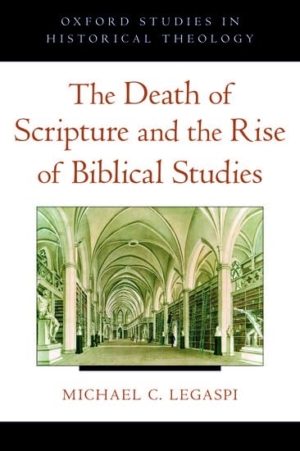Is the church’s Bible also the academy’s Bible? Although we might even ask what this question means, Michael Legaspi argues that the Bible as Scripture is different than the Bible of the academy. In this respect, he indicates a gap between uses . . . Continue reading →
Scripture
Robert Rollock’s Commentary On Romans (6)
In the effectual calling of God it happens that we are now present before God and clothed in the righteousness of Christ, yet we are not yet justified or said to be justified before the sentence of God the Judge about us . . . Continue reading →
Robert Rollock’s Commentary on Romans (5)
And so, the Mediator, the Son of God, took upon His shoulders not only that first defection but also all our other defections and transgressions, and at the same time diverted to Himself the wrath of God the Father justly pursuing our . . . Continue reading →
Robert Rollock’s Commentary On Romans (4)
Therefore, in this example even of Paul regenerate (for now regenerate he says this about himself) we see that even a regenerate person sometimes is made a slave of sin and is led away captive by it. ‘For what.’ He shows that . . . Continue reading →
Robert Rollock’s Commentary On Romans (3)
In verse 27 of chapter 3, after he dwells for a little while on the conclusion of the demonstration and has preached a little more fully about the righteousness of faith, he connects the two parts of the principal syllogism and gathers . . . Continue reading →
Robert Rollock’s Commentary On Romans (2)
And so, you have in that one verse 18 of chapter 1 these three things: First, man is not justified by works; second, man is condemned by works, which is the reason of the former; third, all the works of all men . . . Continue reading →
Robert Rollock’s Commentary On Romans (1)
For, to speak about this epistle to the Romans, nobody could now think, speak, or even write about it enough. For it contains that mystery and those unsearchable riches of Christ. Robert Rollock | Commentary on Ephesians, trans. Casey Carmichael, Classic Reformed . . . Continue reading →
The Path To The Extraordinary Is Through The Ordinary
If we truly believe that Scripture is sufficient, then we must not only believe rightly—we must also worship, live, and love according to the word of God. Semper reformanda must remain more than a slogan; it must become the heartbeat of the church today. . . . Continue reading →
Misrepresenting God Or Bearing False Witness Against God?
Did Paul Allude To The Ninth Commandment In 1 Corinthians 15:15? Christ (and his apostles) lived a millennium and a half before the invention of the printing press; as individuals, they did not own Bibles (or any other books). Most would have . . . Continue reading →
The Cradle Of Christian Truth: Apostles’ Creed (Part 19)—Life Everlasting. Amen
When I was in college, I worked in a warehouse that refurbished science kits for elementary and middle schools. As part of my job, I had to replace used-up supplies for various experiments, like the used-up tape, staples, or flour. One summer, . . . Continue reading →
The Cradle Of Christian Truth: Apostles’ Creed (Part 18)—The Resurrection of the Body
In one elementary school science lesson, we were given bug eggs that we were supposed to help get through the various life-cycle stages. However successful I was at that endeavor with those particular bugs, the principle is something I think we all . . . Continue reading →
The Cradle Of Christian Truth: Apostles’ Creed (Part 17)—The Forgiveness of Sins
When I was a kid, my grandfather would often talk about his hypothetical outline for what he would do if he won millions of dollars. He intended to pay off his own debts and the debts and expenses of all his children . . . Continue reading →
Review: When Christians Disagree: Lessons from the Fractured Relationship of John Owen and Richard Baxter By Tim Cooper
Can we learn anything from the disputes between two seventeenth-century theologians in England, John Owen and Richard Baxter? In this book, Tim Cooper makes the case that we can. And if we can, there are few better-qualified guides than Dr. Cooper. Extensively . . . Continue reading →
The Cradle Of Christian Truth: Apostles’ Creed (Part 16)—The Communion of the Saints
The phrase often goes around that “blood is thicker than water.” One of the ways people use this phrase is to mean that family relationships are more important than relationships made by baptism. In other words, when a family member does something . . . Continue reading →
The Cradle Of Christian Truth: Apostles’ Creed (Part 15)—The Holy Catholic Church
When I lived in the UK, I had to go on one occasion to the US embassy in London. As I entered the embassy, I was struck by how different the atmosphere of the whole place was. A list of things stood . . . Continue reading →
The Cradle Of Christian Truth: Apostles’ Creed (Part 14)—I Believe in the Holy Spirit
I lived in New Zealand for a few months during college for a mission trip. We went to help a church start outreach efforts on the nearby university campus. One day, we attended an event where various organizations set up tables to . . . Continue reading →
Review: To Gaze upon God: The Beatific Vision in Doctrine, Tradition, and Practice By Samuel G. Parkison
Eschatology is one of those perennially discussed (and often debated) topics in Christian theology that, in my estimation, can often miss the main point by getting caught in the details. Usually, the first question it prompts is about what someone’s view of . . . Continue reading →
The Cradle Of Christian Truth: Apostles’ Creed (Part 13)—From there he will come to judge the living and the dead
Casablanca is one of the most famous movies in cinematic history, leaving us with more than its fair share of artifacts ingrained in cultural memory even eighty years later. Humphrey Bogart alone left us with a stack of lines most of us . . . Continue reading →
The Cradle Of Christian Truth: Apostles’ Creed (Part 12)—He Ascended into Heaven and is Seated at the Right Hand of God the Father Almighty
It is a common bug of humanity that we do not like saying goodbye. We even have stock phrases like, “I’m bad at goodbyes,” or, “Let’s say ‘see you later’ rather than ‘goodbye.’” Even “Absence makes the heart grow fonder,” as true . . . Continue reading →
The Cradle Of Christian Truth: Apostles’ Creed (Part 11)—The third day he rose again from the dead
The Trojan Horse is the classic example of a bait and switch. Legend says that, for ten years, the Greeks waged war on the city of Troy. This war went so long because Troy was so well fortified. One morning, the Trojans . . . Continue reading →




